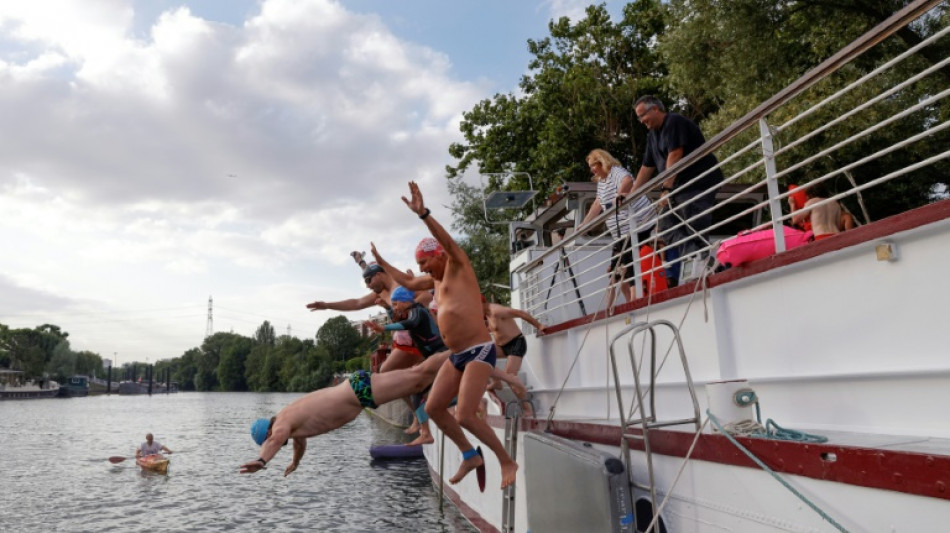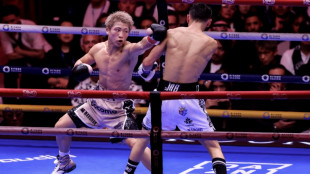
-
 Wirtz scores first Liverpool goal as Anfield remembers Jota
Wirtz scores first Liverpool goal as Anfield remembers Jota
-
Mane rescues AFCON draw for Senegal against DR Congo

-
 Arsenal hold off surging Man City, Wirtz breaks Liverpool duck
Arsenal hold off surging Man City, Wirtz breaks Liverpool duck
-
Arsenal ignore injury woes to retain top spot with win over Brighton

-
 Sealed with a kiss: Guardiola revels in Cherki starring role
Sealed with a kiss: Guardiola revels in Cherki starring role
-
UK launches paid military gap-year scheme amid recruitment struggles

-
 Jota's children join tributes as Liverpool, Wolves pay respects
Jota's children join tributes as Liverpool, Wolves pay respects
-
'Tired' Inoue beats Picasso by unanimous decision to end gruelling year

-
 Thailand and Cambodia declare truce after weeks of clashes
Thailand and Cambodia declare truce after weeks of clashes
-
Netanyahu to meet Trump in US on Monday

-
 US strikes targeted IS militants, Lakurawa jihadists, Nigeria says
US strikes targeted IS militants, Lakurawa jihadists, Nigeria says
-
Cherki stars in Man City win at Forest

-
 Schwarz records maiden super-G success, Odermatt fourth
Schwarz records maiden super-G success, Odermatt fourth
-
Russia pummels Kyiv ahead of Zelensky's US visit

-
 Smith laments lack of runs after first Ashes home Test loss for 15 years
Smith laments lack of runs after first Ashes home Test loss for 15 years
-
Russian barrage on Kyiv kills one, leaves hundreds of thousands without power

-
 Stokes, Smith agree two-day Tests not a good look after MCG carnage
Stokes, Smith agree two-day Tests not a good look after MCG carnage
-
Stokes hails under-fire England's courage in 'really special' Test win

-
 What they said as England win 4th Ashes Test - reaction
What they said as England win 4th Ashes Test - reaction
-
Hong Kongers bid farewell to 'king of umbrellas'

-
 England snap 15-year losing streak to win chaotic 4th Ashes Test
England snap 15-year losing streak to win chaotic 4th Ashes Test
-
Thailand and Cambodia agree to 'immediate' ceasefire

-
 Closing 10-0 run lifts Bulls over 76ers while Pistons fall
Closing 10-0 run lifts Bulls over 76ers while Pistons fall
-
England 77-2 at tea, need 98 more to win chaotic 4th Ashes Test

-
 Somalia, African nations denounce Israeli recognition of Somaliland
Somalia, African nations denounce Israeli recognition of Somaliland
-
England need 175 to win chaotic 4th Ashes Test

-
 Cricket Australia boss says short Tests 'bad for business' after MCG carnage
Cricket Australia boss says short Tests 'bad for business' after MCG carnage
-
Russia lashes out at Zelensky ahead of new Trump talks on Ukraine plan

-
 Six Australia wickets fall as England fight back in 4th Ashes Test
Six Australia wickets fall as England fight back in 4th Ashes Test
-
Dental Implant Financing and Insurance Options in Georgetown, TX

-
 Man Utd made to 'suffer' for Newcastle win, says Amorim
Man Utd made to 'suffer' for Newcastle win, says Amorim
-
Morocco made to wait for Cup of Nations knockout place after Egypt advance

-
 Key NFL week has playoff spots, byes and seeds at stake
Key NFL week has playoff spots, byes and seeds at stake
-
Morocco forced to wait for AFCON knockout place after Mali draw

-
 Dorgu delivers winner for depleted Man Utd against Newcastle
Dorgu delivers winner for depleted Man Utd against Newcastle
-
US stocks edge lower from records as precious metals surge

-
 Somalia denounces Israeli recognition of Somaliland
Somalia denounces Israeli recognition of Somaliland
-
The Cure guitarist and keyboard player Perry Bamonte dies aged 65

-
 Draper to miss Australian Open
Draper to miss Australian Open
-
Police arrest suspect after man stabs 3 women in Paris metro

-
 Former Montpellier coach Gasset dies at 72
Former Montpellier coach Gasset dies at 72
-
Trump's Christmas gospel: bombs, blessings and blame

-
 Russia lashes out at Zelensky ahead of new Trump meeting on Ukraine plan
Russia lashes out at Zelensky ahead of new Trump meeting on Ukraine plan
-
Salah helps Egypt beat South Africa and book last-16 place

-
 Australia's Ikitau facing lengthy lay-off after shoulder injury
Australia's Ikitau facing lengthy lay-off after shoulder injury
-
Another 1,100 refugees cross into Mauritania from Mali: UN

-
 Guardiola proud of Man City players' response to weighty issues
Guardiola proud of Man City players' response to weighty issues
-
Deadly blast hits mosque in Alawite area of Syria's Homs

-
 The Jukebox Man on song as Redknapp records 'dream' King George win
The Jukebox Man on song as Redknapp records 'dream' King George win
-
Liverpool boss Slot says Ekitike reaping rewards for greater physicality


As Olympics brace for Seine dip, rogue swimmers say water's fine
While the 2024 Olympics will stage events in the Seine river from the ornate Alexandre III bridge, a proud declaration of the waterway's environmental renewal, many swimmers in the capital are already defying decades-long bans to take the plunge.
Fears over pollution and safety led to a ban on swimming in the Seine and the Paris canals in 1923, though application of the rules has been relaxed in recent years.
One group of pioneers calls itself "Les Ourcq Polaires" -- a pun invoking polar bears and the name of the canal that is a favourite swimming site, running northeast out of the capital.
In five years, none of their swimmers have been fined, said one member, Laurent Sitbon, and they have been dragged out of the water by police only once.
Thirty years ago, Jacques Chirac, Paris mayor at the time, boasted that the Seine was becoming a "clean river" and that he would soon go for a swim -- though he never did.
But the 2024 Olympic Games organisers plan to hold the triathlon and the open-water swimming events in the Seine, with French authorities investing 1.4 billion euros ($1.5 billion) to clean up the river.
Already pools have been roped off in the Ourcq canal for the annual Paris Plages summer events in recent years, and permanent venues for the general public are scheduled to open in the region by 2025.
On the first Sunday in July, the Polaires organised a dip in the Seine. Swimmers lined the railing on a barge moored at the Ile-Saint-Denis, north of Paris, where the Paralympic athlete's village is being built.
"I can't wait to swim in the Seine! It's something else than a swimming pool," said one swimmer, Celine Debunne.
- 'We've paved the way' -
At 8 pm, with little traffic on the river, around 20 people took to the water for a one-hour outing, covering two kilometres in warm water.
At 25 degrees Celsius (77 Fahrenheit), the temperature "is borderline" too high for a club that has "polar" in its name, said one swimmer, Josue Remoue.
They are just downstream from the setting of French artist Georges Seurat's painting "Bathers at Asniere" from 1884, a time when frolicking in the Seine was common.
"People say, 'You're crazy, you'll get spots'," said Tanguy Lhomme, who was welcoming swimmers to his barge on the recent Sunday.
"As a result, they treat the Seine like a sewer."
Lhomme admits that when he started living on the river in 2017, "it was out of the question for me to get into it".
The club's members go out with inflatable buoys and in groups, which, along with their designated lifeguards, explains why they are "tolerated", Sitbon said.
"The Seine gets a lot of bad press, like all dark-coloured rivers. The colour will never make you dream," said Louis Pelerin, another swimmer.
The Paris police did not respond to requests for comment on their attitude to swimming in the river.
"It's not the pollution but a control of morals that's at the root of it," said Benoit Hachet, a Paris sociology professor who had also dived in.
After summer rains wash dirt from paths and roads into the water, the Parisian authorities post signs banning swimming on the canal banks.
"Pollution is always a great pretext and often a great lie", said Sibylle van der Walt, a German sociologist based in Metz in eastern France, where she campaigns for wild swimming access.
"Whereas in the Nordic countries, people swim at their own risk, in France the mayor is responsible," Van der Walt said.
In the heat waves of recent summers, growing numbers of Parisians have taken to cooling off in the canals.
"More than the Olympics, it's global warming," Hachet said. "In ten years, it'll be 40 degrees. People will go in the water whether its forbidden or not!"
Sitbon also said that attitudes were changing.
"There were only a few of us in 2017. We feel we've paved the way a little."
F.Pedersen--AMWN



